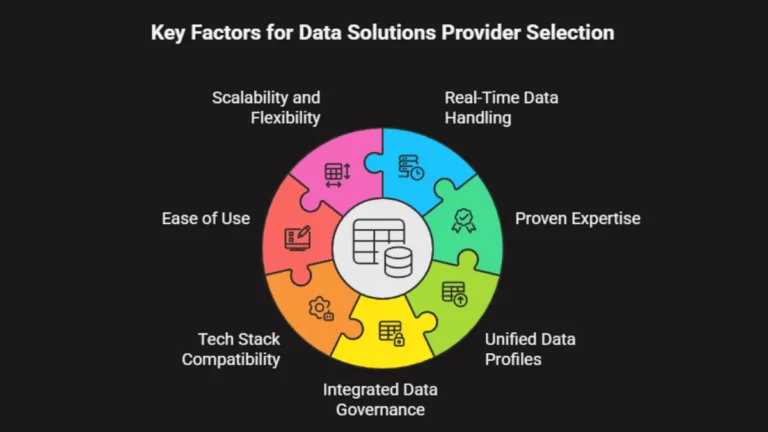Table of Contents
Choosing the best data solutions provider in 2025 is critical for any organization that wants to harness the power of data effectively. With data becoming the backbone of business decisions, marketing strategies, and technological innovation, the provider you select can either unlock new growth opportunities or create complex headaches. This guide is designed to help you understand what to look for when selecting the right partner and how to ensure the tools and services they offer align with your company’s goals.
Understanding the Scope of Data Solutions Providers
Data solutions providers come in many forms — from customer data platforms (CDPs) and cloud service providers to AI-driven data analytics firms. They often offer specialized services such as Data Pipeline development Services and Data Migration Services, which help businesses collect, process, and transfer data smoothly and securely.
7 Key Factors for Selecting a Data Solutions Provider
Let’s break down the first key factor for selecting a data solutions provider, which is the ability to handle data in real-time.
1. Real-Time Data Handling Capabilities
In today’s fast-paced market, data freshness is fundamental. Your ideal provider should support real-time data streaming and ingestion, allowing dynamic, up-to-the-minute customer profiles and analytics. Whether you’re running marketing campaigns or monitoring operational performance, it’s vital that you’re working with current data, not snapshots from days ago.
2. Proven Expertise and Trustworthiness
Choose a data solutions provider with a clear focus on their area, ideally one that builds their platforms from the ground up rather than assembling patchwork technologies. A trusted organization with a solid track record ensures your data is managed securely and compliant with privacy laws such as GDPR and CCPA.
3. Unified and Holistic Data Profiles
A cutting-edge provider enables you to build complete customer profiles combining personally identifiable information with behavioral and pseudonymous data. This unified approach supports advanced segmentation and personalization, helping your teams deliver tailored experiences.
4. Integrated Data Governance
Managing data privacy and compliance should be seamless. Look for providers offering native governance tools that tag data appropriately right at the ingestion stage. This minimizes risks and streamlines audits, showing stakeholders that you handle data responsibly.
5. Compatibility with Your Existing Tech Stack
The provider’s solution must integrate effortlessly with your current CRM systems, BI tools, advertising platforms, and support software. Avoid heavy custom coding by selecting services with ready-made APIs and prebuilt connectors. This compatibility reduces implementation time and ongoing maintenance headaches.
6. Ease of Use for Day-to-Day Teams
Data solutions should empower marketing and customer-facing teams, not restrict them. Platforms that are user-friendly and don’t require constant IT intervention ensure quicker adoption and better ROI. Interfaces should be intuitive, with tools tailored specifically to business users.
7. Scalability and Flexibility
Your data needs will grow over time. A provider that offers scalable infrastructure and flexible service models means you won’t be constrained as your business expands or pivots. Multi-cloud or hybrid solutions are increasingly popular to balance performance, cost, and security.
Why Selecting the right provider matters
Your data is one of your company’s most valuable assets. Fragmented, outdated, or poorly converted data can lead to wrong decisions and lost trust from customers. On the other hand, efficient data management and real-time insights enable better personalization, predictive analytics, and operational agility.
Avoid Point Solutions That Overcomplicate
Beware of so-called “point CDPs” or narrowly focused data tools that only serve one function poorly. These introduce complexity by requiring multiple separate solutions to fit together, increasing costs and reducing reliability. Instead, choose a full-service provider with end-to-end capabilities.
Final Thoughts
Selecting the right data solutions provider in 2025 isn’t simply about finding the biggest or cheapest company. It’s about aligning your vision for customer experiences and analytics with a trusted partner who understands your business, integrates with your tools, and supports you with scalable, easy-to-use, and compliant platforms.
Taking a systematic approach and focusing on critical features such as real-time data management, integrated governance, and strong support for pipelines and data migrations will empower your teams to turn data into meaningful, personalized, and actionable insights — fueling growth and customer loyalty well into the future.
Frequently Asked Questions
A good provider offers services and tools that align with your company’s goals, helping you to effectively harness the power of data for business decisions.
Selecting the right provider is critical because they can either unlock new growth opportunities or create complex headaches for your organization.
A provider helps an organization harness the power of data by offering the tools and services necessary to use it effectively for various business functions.


